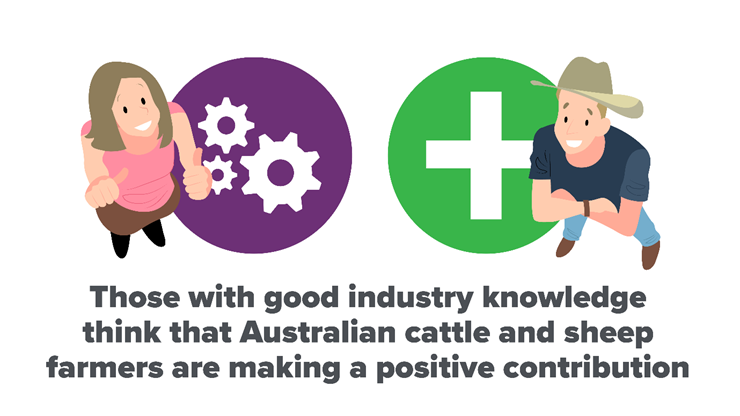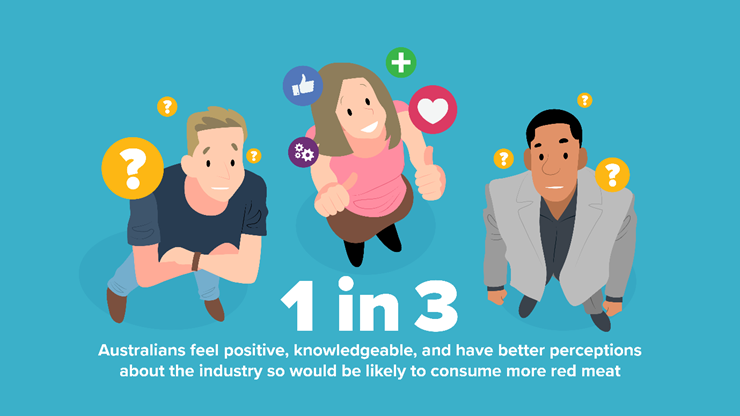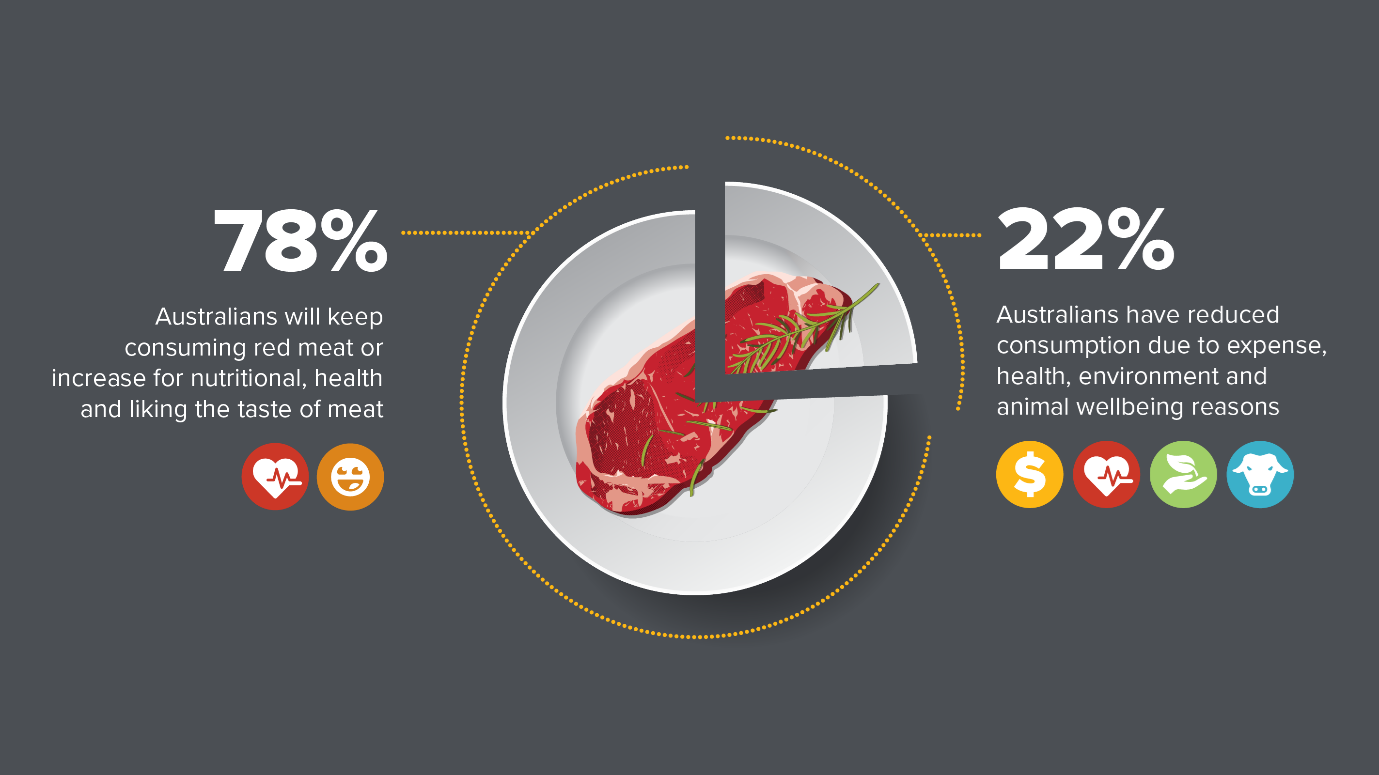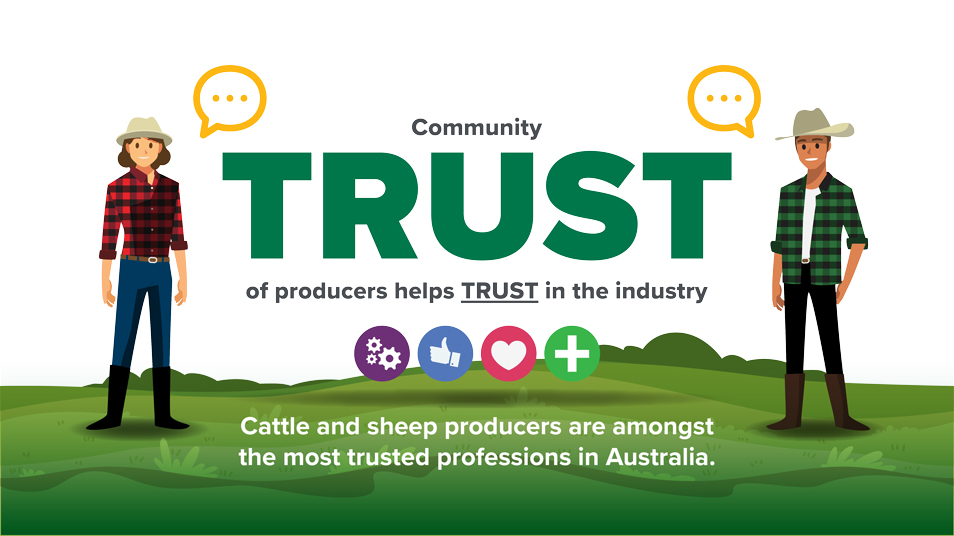Community sentiment research
Australian perceptions about the red meat industry
Project overview and objective
Understanding community sentiment towards the Australian red meat industry is key to informing our investments in community communication and marketing to drive better understanding of red meat production and nutritional benefits for everyday Australians.
MLA has been conducting work with Pollinate market research company each year since 2010. These insights now span a 16-year period, providing us with valuable historical data on trends in trust, attitudes, and consumption habits of red meat by main grocery buyers in Australian metropolitan areas.
Positive perceptions of the red meat industry

Our most recent research conducted in 2025 indicates that the majority of Australians feel good about the beef and lamb industry.
Perceptions of the Australian red meat industry are relatively strong, with 77% believing the beef industry is an important part of the Australian economy, and 72% likewise thinking the lamb industry is important. However, only 35% of metropolitan Australians feel they are knowledgeable of the industry.
Interestingly, the insights also show that positive community sentiment is correlated with the community’s understanding of our industry, hence the importance of sharing information on the red meat industry with the community.
The research data highlights that farmers are amongst the most trusted members of the Australian community, alongside doctors and scientists.
Consumers’ knowledge of the industry boosts perceptions

Drilling down into the details of the research, of the 35% of consumers who feel they are knowledgeable about the industry, they also feel more positive towards the production of red meat in Australia, including that cattle and sheep producers:
- care about the environment
- produce livestock in a humane manner
- make a positive contribution to society.
In addition, over half (53%) of the metro Australians involved in the 2025 research were themselves interested in learning more about how beef and lamb is produced. And 70% of metro Aussies believe it’s important for school children to learn more about how beef and lamb is produced.
These insights also reflected the growing impact of MLA’s programs on building community trust in the red meat industry as well as the provision of school education resources.
With the knowledge that the red meat industry has a priority to contribute to Australia's net zero ambition.
- 53% of metro consumers thought more positively about the red meat industry.
Motivation to change their consumption of red meat

The research also asked questions about whether they have changed their red meat consumption. Pleasingly, red meat consumption patterns have continued to improve, with 78% of metropolitan Australians eating the same amount or having increased their consumption of red meat over the past year.
Among those that indicated to increase their red meat intake, 89% cited health related reasons, including:
- source of protein (58%)
- source of iron (58%
- just like meat (46%)
- improve my health (46%)
On the flip side, the research also indicates that 22% of metropolitan consumers have reduced their red meat consumption over the past year. This level of decline is at the lowest level since the research commenced, however the reasons provided for eating less red meat have changed over time, with expense now significantly higher than the other main reasons being:
- too expensive (60%)
- health concerns (17%)
- environmental concerns (5%)
- animal welfare concerns (3%)
Who isn’t eating red meat?

MLA’s community sentiment research showed the number of Australians who claim to be vegetarian has remained relatively low, continuing to reduce over the past few years.
The 2025 research indicates that 4% of consumers claim to be vegetarian – continuing the downward trend over the past couple of years - and 47% of those who claim to be vegetarian, still eat meat occasionally, so those who are ‘true’ vegetarians or vegans is only around 2% of metro Australians.
Source of information
Not surprising, the internet is by far the key source of information consumers turn to for information on red meat nutrition, animal welfare and environmental impact. Other major sources of information are social media (which has increased as an important source for the younger generations in particular over the past couple of years), TV and health organisations.
Drivers of trust in the red meat industry

Since commencing the research into the trust in the red meat industry and the trust drivers, trust in the industry has reached a record high of 67% of metropolitan Australians having a strong level of trust in the Australian beef and sheep industry to “do what is right”.
The top three drivers of trust in the industry were the perceptions that Australian cattle and sheep farmers:
- are taking actions to reduce environmental impact
- are transparent and responsive, prepared to change practices (
- are ethical and trustworthy with animals humanely raised
- regulations and standards ensuring the industry is doing the right thing
The results of this research also align with the Agrifutures Community Trust in Rural Industries (CTRI) research looking into trust in the agriculture sector as a whole. The link to this research is also provided below in the downloads section.
The impact of trust on consumption
Analysis of consumption patterns and levels of trust in the industry demonstrates that there is a very strong correlation between levels of trust and levels of consumption. Those consumers who had a high level of trust, were much more likely to consume red meat more frequently than those with lower levels of trust. And this also is true in the reverse, those with lower levels of trust were more likely to be a red meat reducer, with lower frequency of consuming red meat.
The strong link between knowledge, improved perceptions, trust and consumption patterns highlights the importance to our industry of continuing to raise knowledge in our industry, listening and demonstrating action to reduce community concerns around animal welfare and environmental impact, to ultimately maintain trust in the red meat industry and overall red meat consumption in Australia.
How we use the research
MLA uses this annual research to inform the community communication and marketing activities it undertakes on behalf of the red meat industry, an important component of which is demonstrating how Australian red meat producers are ethical and responsible custodians of livestock, land and natural resources.
Our focus is to share with the community that the Australian red meat and livestock industry is an ethical and responsible custodian of livestock, land and natural resources. The research also helps provide community trends and areas of concern for future research and development for continuous improvement in the Australian red meat industry’s production practices.
Through MLA’s community communications brand, Australian Good Meat, we are able to provide this information to the public in a clear and transparent way through their most trusted channels to have our positive messages heard which will ensure our industry can remain sustainable now, and into the future.
MLA’s main community engagement priorities are:

Community sentiment: Maintain positive community sentiment towards the red meat industry, highlighting care for environment and animal wellbeing, and the role of red meat in a healthy balanced diet.
Tell our positive stories: Showcase producers’ stories to share their knowledge with the community on the journey from paddock to plate.
Red Meat Green Facts: Provide easy to understand facts on the red meat industry to bust myths and build industry knowledge.
School education: Build teachers’ and students’ knowledge through curriculum aligned topics on the red meat industry.


